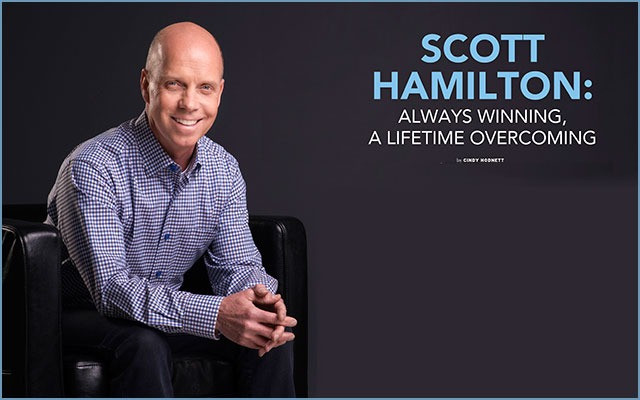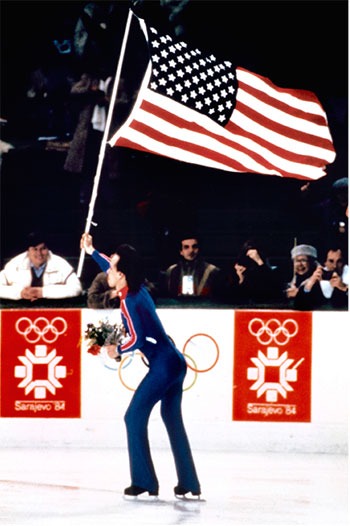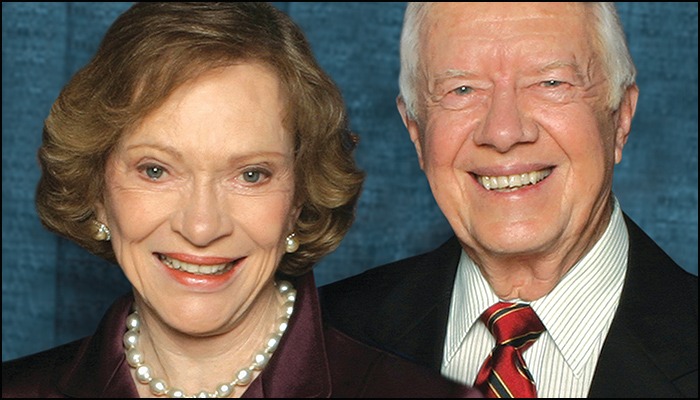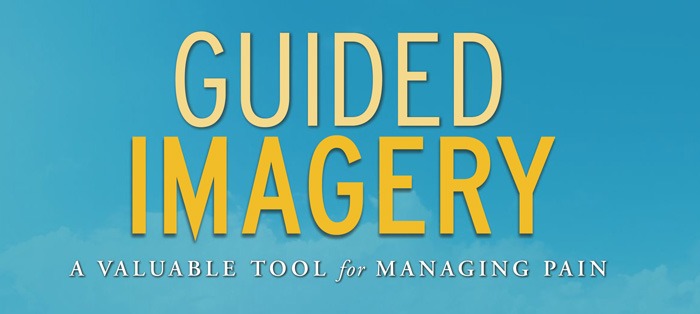Scott Hamilton

Scott Hamilton: Always Winning, a Lifetime Overcoming
The homepage for Scott Hamilton’s website features one simple line of text: “The only disability in life is a bad attitude.” This is a fitting introduction to one of the world’s most recognized male figure skaters and media personalities.
Since winning Olympic gold in 1984, Hamilton has won 70 titles, awards and honors, including induction into the United States Olympic Hall of Fame and the World Figure Skating Hall of Fame. His experience at two Olympics transitioned into a career as an analyst and commentator, producer and best-selling author. But along with his very public roles in the sports world, Hamilton has also become a source of inspiration to individuals battling health and pain issues, sharing his insight as a survivor of testicular cancer and multiple pituitary brain tumors.

The Early Years
Although he began battling his third brain tumor last year, Hamilton’s experience with significant health challenges began long ago. At the age of two, he contracted an unknown illness that caused him to stop growing, mystifying doctors and resulting in nearly six years of unsuccessful treatments. Following an incorrect diagnosis of cystic fibrosis and told he had only six months to live, Hamilton’s parents took him to Boston Children’s Hospital, where they finally received a correct diagnosis: Schwachmann’s syndrome, a rare condition that paralyzes the intestinal tract and restricts breathing. The only treatment for the condition involved a protein-rich diet and regular exercise—recommendations that prompted Hamilton’s introduction into the world of skating and eventual recovery via intense physical activity in the cold environment of the rink.
“I remember feeling sick and always full, never hungry,” Hamilton recalls. “Pain wasn’t really the biggest issue. I remember feeling some pain during the tests they would do, but even with that, I loved being active and enjoying playtime with my friends. I was in and out of hospitals between ages four and eight, so having time to myself allowed me to develop feelings of independence and self-sufficiency.
“To give my parents a morning off, I started going to the Saturday morning Learn to Skate classes at the new ice arena at Bowling Green State University,” Hamilton continues. “I loved being with well kids, and the activity of learning something new was exciting. The greatest benefit of skating was that my health started to improve. No one could explain it, but as long as I was skating, I was getting better. Nothing else worked. Skating did.”
Skating became more than a recreational activity after Hamilton lost his mother when he was 18. A self-described underachiever, he decided that he would honor his mother by succeeding in the field that helped him recover.
“The morning I lost my mother to cancer, I decided that I would take her with me wherever I went,” he says. “She sacrificed a great deal to keep me in skating, and I was an extremely dedicated underachiever until that morning she died. From that moment on, I was going to be different. Better. Hungry.”
The Olympics and Beyond: An Entry into Advocacy
The “hunger” catapulted Hamilton to success at several competitions, including the National and Eastern Figure Skating Championships. In 1980 he competed in his first Olympics, at Lake Placid, New York, and then captured his gold medal four years later in Sarajevo, Yugoslavia. After winning gold, Hamilton began touring professionally and working as a commentator during televised competitions, but his life changed dramatically in 1997 when he began experiencing severe pain in his lower back and abdomen. Doctors discovered a malignant tumor and diagnosed testicular cancer. Hamilton underwent surgery and chemotherapy at the Cleveland Clinic Taussig Cancer Center, where he had already founded the Scott Hamilton Cancer Alliance for Research, Education and Survivorship (CARES).
After his treatment, Hamilton expanded his activist and advocacy roles by launching chemocare.com, a website to help cancer patients understand chemotherapy and the accompanying side effects. He also spearheaded events to fund cancer research, including Sk8 to Elimin8 Cancer and An Evening with Scott Hamilton & Friends. Later, he founded the Scott Hamilton Skating Academy in Antioch, Tennessee, where he continues to coach students and share his passion for the ice.
“Skating has taken huge leaps athletically since I competed,” Hamilton says. “Nowadays, doing quadruple-rotation jumps is the norm, but when I was skating, quads were considered to be impossible and only done by people who wanted to tear their bodies apart. Now, doing four quads in a long program is what is expected in order to be in a position to win.
“All the quads came from the endless advancement that comes from a competitive environment,” Hamilton continues. “If I was competing now, my whole approach to jumping and technique would have to be overhauled to rotate differently and more efficiently.”
Brain Tumor (Part 3) and Everyday Life
Hamilton’s 1997 testicular cancer was followed by the diagnosis of two brain tumors, in 2004 and 2010. His third bout with the benign pituitary tumor began last year, just as he was preparing for the publication of Finish First, a book described as a “wake-up call for business leaders, entrepreneurs, spouses, parents and even students to stop settling for mediocre.” When asked to identify the most memorable takeaway from Finish First, Hamilton cites that it is his philosophy about failure.
“To me failure is feedback, information, nothing more,” he says. “I have suffered from what I thought at the time was humiliation and devastation from failure. I now realize it was the temporary discomfort of not knowing how to be better and more competitive. If people today were to look at failure as information, they could apply what they have learned and keep moving forward.
“The general emotion failure produces is humiliation and the feelings that come with never wanting to be in that position again,” Hamilton explains. “My outlook is a little different. Instead of never wanting to be in that position again by not doing whatever caused those feelings, how about learning from that and using that experience to inspire growth?”
With a nod toward his own pathway to success and battles against pain and health challenges, Hamilton says he believes sports are “truly designed for character and physical development.” He adds that while most people won’t compete professionally in their sport of choice, there is still tremendous benefit in participation.
“We are to learn from sports—how to be hardworking, resilient, brave, productive, decisive, and to handle victory and defeat with the same dignity,” Hamilton says. “Winning and losing are at the root of all sports; there has to be a winner and a loser. We need to learn how to learn from failure, and also learn to be humble when victorious. We are all built for something. We all have certain skills, a purpose. The idea is to leverage everything we experience to build our identities and what we have to offer this world.”

Success Today
Now nearing 60, Hamilton enjoys the golf course as well time with his wife, Tracie, and four children at home near Nashville, Tennessee. He says his fitness routine has changed by necessity, along with some of his most significant future goals.
“Fitness for me these days comes and goes,” Hamilton says. “It seems to be very difficult with my schedule to stay consistent with a fitness regimen. Being close to 60 years old, it is a challenge to keep up with my teenage children and my ten-year-old. Pain these days is welcome soreness from a hard workout. My physical afflictions don’t really cause pain. They cause more fatigue and nausea.”
And when it comes to future goals and his own definition of success, Hamilton explains that some are family focused while others involve continued advocacy and a desire to help others enduring difficult health, and life, situations.
“Personally, I would love to be able to spend more time at home with my children until they launch,” he says. “Professionally, I would love to continue to develop my speaking and writing skills to touch more and more people. I feel as though I have endured a lot and have a lot to say to those who are in the middle of something that they see no way out of.
“Success these days is different,” Hamilton concludes. “My focus is different. How do I serve my children? How do I impact my community? When I was younger, it was all about me and what I could learn and build. Now it’s about serving others. Whether I am serving my children, or people living with cancer, it will always be about giving the best I have and learning from the times I have fallen short.”
Nine Notes with Scott Hamilton
PP: What’s your favorite meal?
Hamilton: Anything Asian
PP: What’s your favorite place to get away?
Hamilton: Probably the ocean.…Pick one!
PP: What’s your favorite way to spend a free afternoon?
Hamilton: Golfing
PP: Favorite Olympic sport (after skating)?
Hamilton: Hockey
PP: Most memorable book you’ve read?
Hamilton: The Bible
PP: Who is the athlete you admire the most now, in any sport?
Hamilton: Mike Fisher (Nashville Predators)
PP: What is the biggest misconception people have about competing in the Olympics?
Hamilton: That it is always fun and relatively easy.
PP: What would people be most surprised to know about you?
Hamilton: That it has never really been about me.
PP: Any additional comments you would like to make?
Hamilton: We all have something to offer that is as different as we are to this world. There are no two people alike. No one shares the same path with someone else. We are all unique, and we need to [conduct] our lives in a way to take advantage of our uniqueness to make the world a better place.
A Neurosurgeon Reveals More About Brain Tumors: Understanding Brain tumors, Myths V. Facts
Headaches can be a symptom, but don’t freak out
The next time you get a piercing headache, don’t jump to any conclusions. The ones brought on by brain tumors aren’t your average headaches, says John G. Golfinos, MD, chair of the department of neurosurgery and co-director of the Brain Tumor Center at NYU Langone Medical Center. They’re persistent, and tend to be worse in the morning and improve throughout the day. “That’s because when people are lying flat, the pressure in the skull and brain goes up, and during the day some of the pressure starts to go away,” he explains. What’s more, brain tumor headaches are often associated with nausea and vomiting.
Not all brain tumors are cancerous
“There’s a whole spectrum and range of outcomes for brain tumors,” says Dr. Golfinos. As in Hamilton’s case, some are benign, “which means they grow very slowly in the brain or just outside the brain,” he explains. Others are malignant, grow very quickly and are incurable.
Even benign tumors can cause major issues
The reason brain tumors can be so risky is that the skull is a thick, confined space: “So anything that grows inside or just outside the brain can take up a lot of room and press on important parts of the brain, causing a lot of problems,” Dr. Golfinos says. “That’s why we say with brain tumors, it’s not just what type of tumor is it, but where is it.”
The problems can include loss of vision, difficulties with speech, issues understanding language or weakness on one side of the body. Symptoms can be subtle in the beginning, especially if they’re caused by a benign, slow-growing tumor, says Dr. Golfinos. But if you notice any of those changes, it’s a good idea to see your doctor.
Brain tumors can’t escape your skull
Brain tumors are unique in that they can’t spread to other organs, since they don’t have the same access to the bloodstream that tumors in other parts of the body do, Dr. Golfinos says. “The brain itself is a very privileged part of the body,” he notes. “It’s good at keeping things out, but also good at keeping things in.”
Your phone won’t cause a tumor
You may have heard the myth that constantly talking on your cell causes cancer. According to Dr. Golfinos, you have nothing to worry about, since there’s no good evidence to suggest this is true. The reality, he says, is that “We really don’t understand what causes brain tumors.”
You can’t prevent tumors from developing
“Many people ask me if there’s anything they can do to avoid brain tumors,” says Dr. Golfinos. “And right now the answer to that is no.” That said, to play it safe, Dr. Golfinos recommends avoiding exposure to excess radiation whenever possible (by opting for an MRI over a CT scan, for example), especially for anyone under the age of 18.
PainPathways Magazine
PainPathways is the first, only and ultimate pain magazine. First published in spring 2008, PainPathways is the culmination of the vision of Richard L. Rauck, MD, to provide a shared resource for people living with and caring for others in pain. This quarterly resource not only provides in-depth information on current treatments, therapies and research studies but also connects people who live with pain, both personally and professionally.
View All By PainPathways






